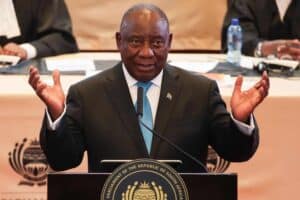The decline from his popularity and public respect four years ago has been steady and is probably irreversible.

President Cyril Ramaphosa’s Stalingrad defence, coupled with his willingness to sacrifice a brace of high-value and powerful pieces at Eskom, has succeeded.
Twice in the past week, the strength of the radical economic transformation (RET) faction has been shown to be vastly overstated. First, the president last weekend easily won the backing of an ANC national executive committee that was almost universally touted as being so evenly divided as to inevitably thwart his best efforts at reform.
A second mutiny, this time of parliamentary grassroots, didn’t materialise, either. One can safely deduce from the pathetic performance of the RET forces in these two skirmishes that a drubbing awaits them at this weekend’s leadership conference. These may, however, have been pyrrhic vitories.
South Africa enters the final stretch of what has probably been the most dismal year in close on 50 years not with optimism for 2023, but with dread. Ramaphosa’s personal integrity and the standing of his office are at a new low.
The decline from his popularity and public respect four years ago has been steady and is probably irreversible. And after the routing of the RET, Ramaphosa has no excuses. Any continued preference for inertia over action now looks less like justifiable caution than contemptible spinelessness.
A telling illustration of this is his abject failure to protect Eskom CEO André de Ruyter from vicious attacks from within the party and its allies and the subsequent resignation of De Ruyter on Wednesday.
While the issues of race are always fizzing and popping somewhere in the cauldron, the primary reason for the objections to De Ruyter from black business organisations and the un- ions was not his melanin content, but his very successful campaign against corruption.
This threatened to deprive ANC political elite of a lucrative target for looting. However, the biggest problem, De Ruyter told News24, was at the highest level.
“The job in its current configuration is impossible. There is a lack of support and when this became clear to me, it became fundamentally untenable [to continue], given the repeated attacks on me and Eskom’s strategy by senior members of government.”
De Ruyter was referring to the scurrilous at- tacks on him by Mineral Resources and Energy Minister Gwede Mantashe. Last week, Mantashe accused the Eskom boss and his executive of “actively agitating for the overthrow of the state” through load shedding.
Load shedding, said Mantashe, was “worse than state capture” and De Ruyter acted “too much like a policeman” in his attempts to curb corruption at the utility.
These astonishing statements – including the defamatory slur of treason – were calculated to provoke the exit of De Ruyter. And when neither Public Enterprises Minister Pravin Gordhan, nor Ramaphosa, uttered a word in defence of De Ruyter or in rebuke of Mantashe, the CEO’s resignation became inevitable.
None of this should surprise us. Ramaphosa has always been forthright in stating that his primary objective as president of the republic is to prevent division within the ANC. So, to sacrifice De Ruyter was a simple decision.
READ NEXT: Bonga is proof there is power in the English language
Support Local Journalism
Add The Citizen as a Preferred Source on Google and follow us on Google News to see more of our trusted reporting in Google News and Top Stories.






